This week marks the 16th profile in Women & the Ways We Work and features an interview with Erin A. Frost. I’m thrilled to share her perspectives because Dr. Erin Frost is one of the people I turned to in my study of feminism in graduate school. We first met briefly at a Design of Communications Conference in 2013, the same fall I was pursuing a more in-depth exploration of feminism in grad school. She gave me more authors, experts, and concepts to explore, which encouraged a craving for more women’s empowerment in communication and leadership. I’m so glad there is an Erin entrenched in the academy, doing research, writing, and advising people to find their path with these areas.
-
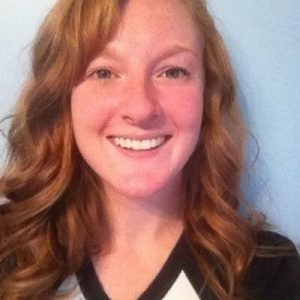
Erin Frost
Erin, outside of conferences and feminism in communications, I’ve never gotten to know you. What did you want to be when you “grew up” and how has that evolved?
I wanted to be a paleontologist! (I was kind of a nerdy kid.) I also wanted to be a writer. I realized as I grew older that paleontology — the kind I wanted to do — would require a lot of travel and might not be conducive to having a family. I also developed more and more of an affinity for writing, especially news writing. After earning a double BA in English Composition and Journalism, I worked for a daily newspaper for several years and found that I loved being in a field where I got to research a variety of things and talk with lots of different people with diverse backgrounds. It allowed me to constantly learn! As I was pursuing my Master’s degree, I realized that I could do those same things with a career in the academy plus feel as though I was able to more directly positively influence people’s lives. - So, what do you do in the academy now?
I’m an Assistant Professor of Technical Communication and Rhetoric at East Carolina University. I chose this job because I’m passionate about learning and helping people communicate more effectively. I noticed that many people read technical documents without being critical of them. Technical documents — instructions, laws, medical texts and consents, etc. — often come across to readers as objective, neutral, and authoritative, but they have biases just like any other document. These documents seem objective to us precisely because they are culturally saturated. That is, they are deeply embedded in the cultures that support them. I often take a feminist approach to technical documentation, and I ask students to think about how this approach might change the way they view a given document. Teaching about the cultural frameworks that support technical communication is exciting to me because it helps people find new avenues for action. They realize that “objectivity” is a complicated concept, and they realize that they can do things they never thought possible. - Very interesting. How happy have you been with your choices?
I’m lucky in that I feel very happy with my choices, though I have sometimes second-guessed my reasons for making them. For example, I wrote above that, “I realized paleontology would not be conducive to having a family.” While I’m quite happy to be an English professor rather than a paleontologist at this point in my life, I regret that my career choice was influenced by social expectations of what a family/mother should look like. Happily, though, I think a lot has changed in the last couple decades regarding social expectations of what a family should look like and what a working mother can accomplish. - I loved that you pointed out your reasons, but your statement made me think too…that women are so much more likely to pick their careers around their family or romantic hopes. One thing I liked to explore in this series is the experiences women, specifically have had. What advantages, barriers, and motivators for women have you observed?
This is a really interesting, exciting, and scary time to be a woman. Women have many advantages that they did not have a few decades ago in this country. That progress is in itself a great motivator. Some of the things that politicians have recently said about women and legislation prescribing women’s bodily autonomy have also been incredible motivators for women to be politically active… I participated in the Women’s March on Raleigh, and it was a fantastic experience.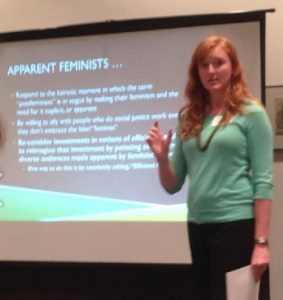
Dr. Erin A. Frost teaching at a public event, “Downtown Dialogues” at the Greenville Museum of Art
All that said, women also still encounter a lot of barriers. Many of those barriers are social rather than legal and are therefore that much harder to fight. As an example that implicates me: I taught a class a few years ago on feminist rhetorics and I asked a colleague to observe. He kept track of how often I called on women and how often I called on men, as well as how long I let them talk. I favored the men, even though I was actively trying not to. It’s something I continue to work on. This aligns with a whole bunch of studies showing that we perceive women as taking up more rhetorical space than men if they speak up substantively at all in professional situations. (Generally, most of the studies I’ve read seem to show that we—both men and women—perceive women as dominating conversations when they speak 30% of the time in equal-gender professional settings.) There’s also an enormous body of evidence that indicates that women are hired/promoted based on experience and men are hired/promoted based on potential, and that women, especially women of color, are expected to do a lot more work and higher quality work than men in similar positions to receive the same recognition. These are barriers that are difficult to address.
I also have to point out that many times, I encounter events that are both motivators and barriers and these events challenge me to be a better feminist and a better person. After the Women’s March, there was a lot of discussion of it being a white women’s movement. That hadn’t been my perception or experience, and I was initially frustrated by the internal critiques that were happening about an event that I felt so positively about. But then I realized that I wanted others to feel positively too, and they weren’t feeling that at all. I re-read Crenshaw’s work on intersectionality and I’m reading more about those critiques of the Women’s March as motivation to do better. I think turning barriers into motivation is important.
- You talk about reading a lot, which I love since I’m a voracious reader and writer. What are your best sources for learning?
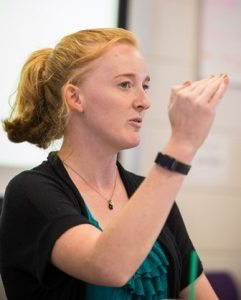
Dr. Erin Frost Leading Discussions
Nothing replaces reading for learning, at least for me. I am more drawn to articles than books when it comes to my research, because books take so long to publish that they’re sometimes behind the times before you can even buy them. That said, culture moves slowly and many books do a great job of addressing long-standing cultural trends. Two of my recent favorites are Roxane Gay’s Bad Feminist and Julia Serano’s Excluded.
I also love conferences, and I find Twitter especially useful when conferences are happening because it allows you to interact with many conversations and people at once—even if you can’t attend everything.
A lot of people have been talking lately about social media producing “echo chambers” where people only see/hear their own views. I think that’s possible, but not much more so than with any other medium. (I choose books I expect to like, for example.) So, I think social media are great for learning—especially if you curate your accounts for that purpose.
- What is your passion, all this work, and why is it important to you?
I love teaching and I love research. I especially love when the two come together. Some of my favorite parts of my job are when I get the chance to advise someone about their studies, career, or life, and I know that the advice I’m giving them is solid and that it will make a difference for them. - You’re committed to so much. What do you devote most of your time to “outside of work?”
Traveling, reading (the boundaries between “reading for pleasure” and “reading for work” often blur for me), and hanging out with my husband, Andy, and our menagerie of pets: Fancy the bearded dragon, Sharky the cat, Melody the dog, and Ginger, Holly, and Garfield the giant koi fish. (We think Garfield will be having babies this year.) - That’s fun! I’m glad you’ve got some light-hearted, silly stuff too. How do you feel most inspired?
I feel most inspired when a project I’ve been working on comes together. There’s nothing quite like the feeling of putting something on paper in a way that makes sense to other people and not just in your own head! In the same vein, I think dialogue is so important. That feeling of satisfaction at communicating effectively isn’t just about large, written research projects; it’s also about productive conversations in any number of forums. - What causes or organizations are you most interested?
I am passionate about working for inclusion—particularly related to gender and race—in my field. This means being active in my field’s main organizations, the Association of Teachers of Technical Writing (ATTW) and the Council for Programs in Technical and Scientific Communication (CPTSC). It also means being a resource for graduate students at East Carolina. I’ve found that some of the most important work I’m able to do in this regard doesn’t always align well with organizational goals, so it’s a cause that often ends up playing out in messy but exciting ways. - You’re ingrained in so much advancement. Who do you look up to professionally?
Professionally, I look up to people who speak out even when it might not be popular—people who are willing to take risks to their reputations in order to help others because they know that staying silent does not mean they are neutral. One example would be Sheryl Sandberg, a technology executive and activist best known for writing the book Lean In. The book was widely praised for talking about the barriers that continue to exist for women in business. It was also widely critiqued for not being attuned to the struggles of women who aren’t wealthy and/or white. I could probably write a book about that book and its reception, but my point is that Sandberg did something. Her book had flaws, but it’s much more useful than all the other books that never got written at all. It’s the beginning of a conversation.
- I wholeheartedly agree. We had to start somewhere and get more dialogue. But, what about personally?
I’m lucky to have many people that I look up to personally. My parents, sister, and brother-in-law are all people who are both incredibly successful and incredibly kind; I try to be more like them every day. I have a number of mentors here at East Carolina who consistently model what it looks like to be a “giver”—someone who puts students and the institution first (though not at the expense of self, so that they can keep on giving in the future!). I also am inspired every day by the bravery of my husband, who went back to college as an adult even though it was hard. Generally, I look up to people who persist in doing good in the world even—especially—in the face of adversity. - Best and worst advice you ever received?
Best advice: Do what you’re interested in. (A lot of people say to do what you’re passionate about, but passion can be fickle. Interest is serious; interest is sustainable. You’ll never regret doing what interests you.)Worst advice: Don’t be greedy. (While I think this can be good advice in certain contexts, it’s too often used to prevent women from asking for well-deserved compensation or advancement.)
Oh, I really love that interest bit.
Erin also has an interest to Stop Human Trafficking Now in Eastern North Carolina. Visit Erin’s website, connect with her on LinkedIn, and follow her on Twitter.
Thanks for reading Erin’s story. Share in the comments how it impacted you or share it on social media. Check out next week’s weekly post on Women & the Ways We Work. Missed the others? Take a look at my blog to read the others. Know someone you think should be featured? Can I help you or your organization with a storytelling project? Contact me and let’s chat.

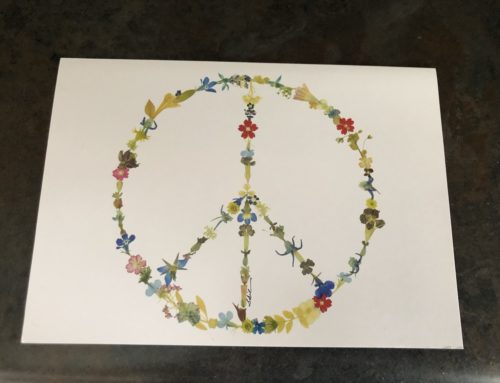
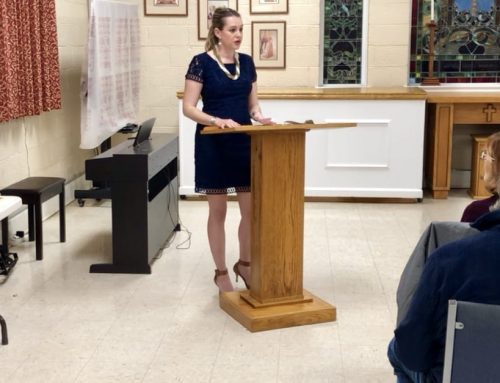
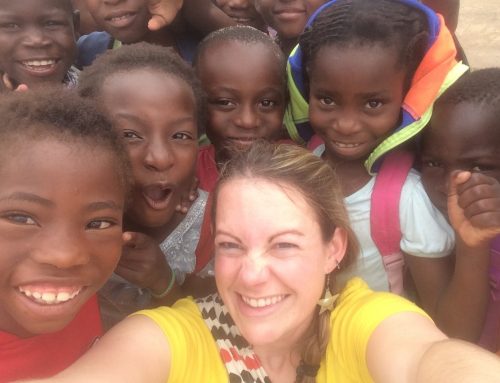
Leave A Comment
You must be logged in to post a comment.